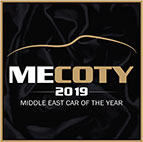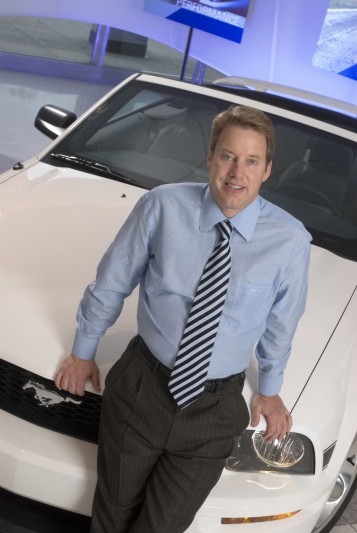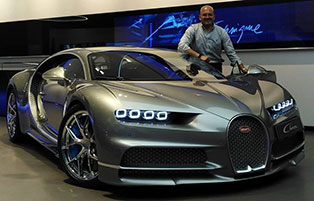Ford
“The Future of Mobility” as Bill Ford, Ford Motor Company Executive Chairman, sees it !
In an historic visit to the Middle East, organized and co-hosted by the Dubai Chamber and Ford MEA (Middle East and Africa), Bill Ford spoke about the future of mobility in an ideal location: the modern, fast-growing city of Dubai.
At a meeting co-hosted by the Dubai Chamber, Bill Ford made a surprising statement: “Given how much I like cars, it may surprise you that I believe the auto industry needs to rethink its approach.” The issue: “global gridlock,” fueled by worldwide population growth and increased prosperity.
Before an audience of government officials and business leaders, Ford outlined the issue. “Today there are about one billion vehicles on the road worldwide. But with more people and greater global prosperity, that number is expected to double, and possibly double again, by 2050.”
He discussed how congestion is impacting high-growth cities, noting that “Dubai’s road network has grown by 50 percent in the past eight years. But you can’t pave your way out of the problem.”
The potential impact of global gridlock, he noted, could be considerable – from economic prosperity and growth to how people access food and healthcare.
And while the situation is of great concern, Ford was quick to focus on solutions and highlight progress being made in a number of areas. I
And while global gridlock poses a significant challenge, Ford said that the auto industry could not stop there. “What if we could move from solving problems created by vehicles, to vehicles solving longstanding societal issues?”
He then shared a number of examples that Ford Motor Company is working on where new automotive technologies are enabling vehicles to play a role in solving non-mobility challenges.
For example: a Ford project in India that uses onboard connectivity to help aid workers provide medical care to expecting mothers in rural communities – by using the vehicle to collect and transmit medical data to a city-based doctor. As a result, the company has helped provide healthcare to more than 1,600 women and children; helped set up 27 health camps; and reached another 54 villages to facilitate maternal and child health awareness.
Another example included how cars could help strengthen a developing country’s infrastructure by using vehicles that transport rural medical aid and equipping them with sensors to map the rural roads as they drive. Doing so would help improve the movement of goods and services and economic growth.
Ford also discussed how autonomous driving could help extend the “driving life” of the elderly – an issue of growing importance in developed countries with aging populations – and how it could improve their quality of life, and reduce some of the dependency on caregivers.
Ford remarked that, “As technology quickly evolves, we must push ourselves to look for new opportunities to solve bigger issues. This is the next challenge before us. We must find ways that mobility can improve the human condition.” Finally, he noted that this challenge was a return to his roots, to a time when the car played a can-do, almost “heroic” role in our lives.
“Once, the automobile represented possibility. I think we are there again.”
PR
19.11.2014
Dubai - Detroit - Cairo
Related articles:
#SaferCarsForEgypt
 Want to sell your used car or buy one? Then check out our new used car market section
here!
Want to sell your used car or buy one? Then check out our new used car market section
here!
 Looking for a good service center or aftersales customer service? Did you have any bad experience with your car dealer or service center? Then check our 'automotive evaluation charts'
here!
Looking for a good service center or aftersales customer service? Did you have any bad experience with your car dealer or service center? Then check our 'automotive evaluation charts'
here!
Is Egyptian car market corrupt or collapsing?

Is the Egyptian car market collapsing or is it just a corrupt and unprofessional car market?
This is surely one of the most asked questions these days. Everybody is asking ...
AutoArabia Consulting
Middle East Car of the Year

Read more
Crash Test Results

Subscribe




 The all-new 2023 Ford Ranger: new high-tech features ...
The all-new 2023 Ford Ranger: new high-tech features ... FORD IS MAKING FACE MASKS IN THE U.K. AND FACE SHIELDS ...
FORD IS MAKING FACE MASKS IN THE U.K. AND FACE SHIELDS ... فورد الشرق الأوسط تكشف النقاب عن ثلاث مركبات من طرازاتها الأسطوريّة
فورد الشرق الأوسط تكشف النقاب عن ثلاث مركبات من طرازاتها الأسطوريّة Ford Middle East unveils New-Gen 2018 Expedition, 2018 ...
Ford Middle East unveils New-Gen 2018 Expedition, 2018 ... CUSTOM SHOW EMIRATES RACES AHEAD IN ITS THIRD LAP
CUSTOM SHOW EMIRATES RACES AHEAD IN ITS THIRD LAP FORD PERFORMANCE SALES DOUBLE IN EUROPE AS GLOBAL ...
FORD PERFORMANCE SALES DOUBLE IN EUROPE AS GLOBAL ... Ford Egypt ALJ offers the Fusion with latest safety features
Ford Egypt ALJ offers the Fusion with latest safety features FORD CEO MARK FIELDS ANNOUNCES NEW RESEARCH ...
FORD CEO MARK FIELDS ANNOUNCES NEW RESEARCH ... COUNTDOWN TO WORLD CAR CONTINUES BY ANNOUNCING WORLD ...
COUNTDOWN TO WORLD CAR CONTINUES BY ANNOUNCING WORLD ... FORD OF BRITAIN CELEBRATES 100TH ANNIVERSARY
FORD OF BRITAIN CELEBRATES 100TH ANNIVERSARY




